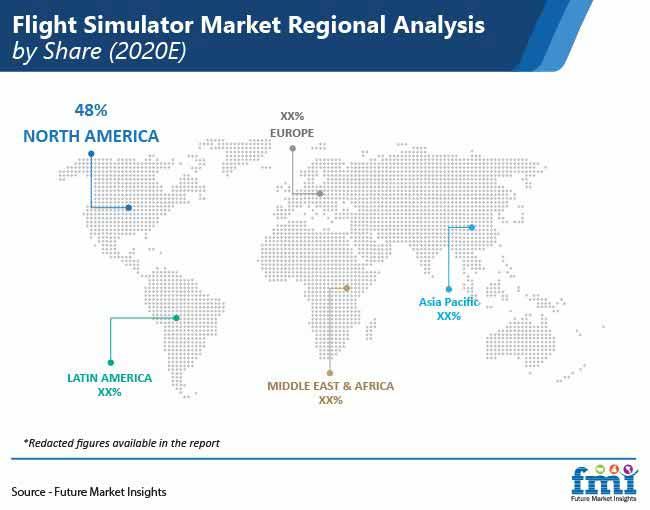Predominantly driven by their civil and military & defense applications, demand for flight simulators is projected to see a steady growth outlook during 2020 – 2030. A new Future Market Insights (FMI) study forecasts that the global flight simulator market will experience around 1.5X expansion in revenues over the period of projection, and developing Asian economies hold a lucrative position for stakeholders.
Mass adoption of air travelling by consumers in developing countries of Asia Pacific warrant addition of airline routes, and personnel such as traffic controllers, pilots, and cabin crew. This acts as a major factor assisting growth of the flight simulator market. Growing integration of augmented reality (AR), and virtual reality (VR) applications in flight simulators will strengthen the prospects of flight simulator market. Efficiency of these next-gen technologies to imitate real-life situations is central to the demand for flight simulators.
Request a report sample to gain comprehensive market insights @ https://www.futuremarketinsights.com/reports/sample/rep-gb-11598
Key Takeaways of Flight Simulator Market
- Full flight simulator (FFS) accounts for more than 90% of flight simulator sales.
- Civil applications account for over 69% of total adoption.
- Military & defense industry will emerge as a highly lucrative area of investment for market stakeholders, with a projected 5% CAGR through 2030.
- Adoption of fixed flight training devices is projected for an impressive surge in the near future.
- North America maintains hegemony, with nearly half of the total market value.
- Flight simulator market in South Asia is poised for a healthy 6.8% CAGR during the forecast period.
Flight simulators are witnessing a new wave of technology ushered by AR and VR. The shift of focus on skill competency, safety of operations, and situational awareness in pilot training programs will further augment the adoption rate of flight simulators.

COVID-19 Impact on Flight Simulators Market
Flight simulators are amongst the most vulnerable verticals hit by COVID-19 pandemic. As airline companies struggle to make ends meet, many have suspended all operations. Governments are deploying air fleets to rescue citizens stranded in foreign countries. This further strains cash reserves of airline companies. Since flights are being flown on a pro-bono basis. Government rescue funds offer some sigh of relief, but a full-fledged recovery is only possible post the pandemic. This detrimental impact on the airline industry is likely to cause a significant fall in the demand for flights simulators. As the industry faces an excess of idle workforce they will not invest in training new pilots during the pandemic.
Market players are in the long haul, even after the pandemic, the airline industry would be on a steep downfall for a while – in terms of ticketing, and on premise sales. Our analysis reveals that there would hardly be a sign of normalcy before Q3 2020. Financial burden of current outstanding refunds, and consumer behavior post COVID-19 will dictate the recovery of the airline industry. Which will further influence the recovery and uptake in demand for flight simulators during the forecast period.
For Information On The Research Approach Used In The Report, Ask Analyst @ https://www.futuremarketinsights.com/ask-question/rep-gb-11598
Flight Simulator Market – Key Participant Insights
Flight simulators have been ideal for usage in effective training of airline staff, which continues to push their adoption by airline companies. Innovative applications of flight simulators in cabin crew and ground crew training will further present gainful opportunities in the global market. Key market players are leveraging these innovative applications such as air traffic controller training to differentiate their products in the market.
Developments in Aircraft Simulation Technology (AST) is a popular product differentiation strategy among market players. Major players are forging long-term relationships with suppliers, technology partners, and vendors to expand their production capacities. Reducing the time-to-market, and expansion of global footprint will dictate the competitive landscape in the flight simulator market.
Key players in flight simulator market that have been covered in this FMI report include, but are not limited to, CAE Inc., L-3 Communications Holdings Inc., Flightsafety International, The Boeing Company, Thales Group, Collins Aerospace, Airbus Group N.V., Indra Sistemas SA, and TRU Simulation + Training.
Know More About Inclusions of FMI’s Flight Simulator Market Report
A new market research report published by Future Market Insights (FMI) on the global flight simulator market provides in-depth insights into the market demand trends and assessment of opportunities during the forecast period. The report analyses the flight simulator market on the basis of different simulation types, end-use, and across seven major regions. The flight simulator report also offers detailed analysis of pricing by different types, COVID-19 impact on market growth and projected demand growth over the forecast period.
About Technology Division at Future Market Insights
The technology team at Future Market Insights offers expert analysis, time efficient research, and strategic recommendations with an objective to provide authentic insights and accurate results to help clients worldwide. With a repertoire of over 100+ reports and 1 million+ data points, the team has been analyzing the industry lucidly in 50+ countries for over a decade. The team provides a brief analysis on key trends including competitive landscape, profit margin, and research development efforts.
